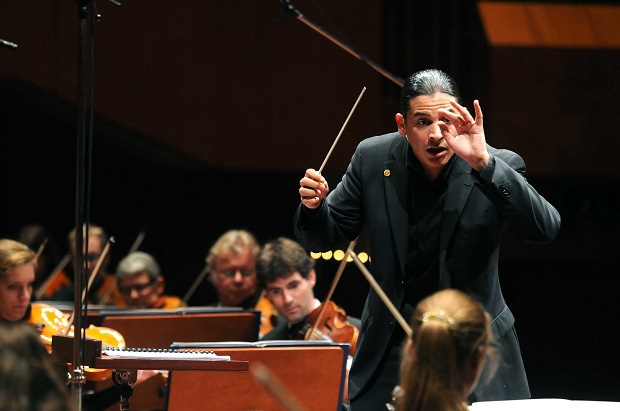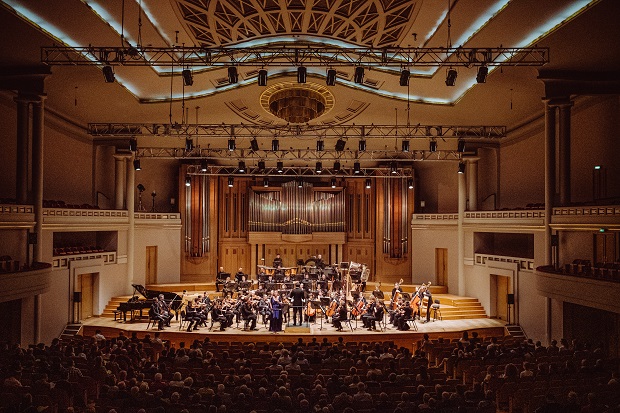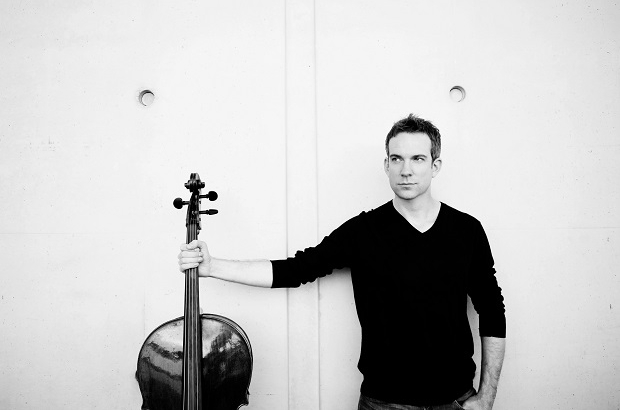- Daily & Weekly newsletters
- Buy & download The Bulletin
- Comment on our articles
Johannes Moser plays Dvořák with Flanders Symphony Orchestra at Bozar
World-famous German-Canadian cellist Johannes Moser presents Dvořák’s masterpiece cello concerto in a concert series across Belgium with Flanders Symphony Orchestra (Symfonieorkest Vlaanderen), conducted by Venezuela-born Spaniard José Luis Gómez (pictured below), from 18 to 28 November.
The highlight of the programme - also featuring Martinů, He and Brahms - is Dvořák’s concerto, written in 1894. Says Moser: “It’s one of the crown jewels of the cello repertoire, a perfect combination of dazzling virtuosity and heartfelt emotion.”
The Czech composer was writing it at the end of a period teaching music in New York when he learnt that the woman he first fell in love with was terminally ill. “He rewrote the ending for her. You cannot get more personal and heart-wrenching.”
For Moser, Dvořák understood the “heroic nature” of a solo concerto. “In the first movement, it ticks all the boxes that you need for a brilliant solo and as the piece progresses it becomes more personal and a reflection of nature and emotion.” If the cellist has performed it hundreds of times, “the human drama” of the piece prevents any possible boredom. “Every time I have such an incredible journey with it and the audience can also expect to be taken on an emotional journey.”

Despite playing the concerto since he was a teenager, Moser faces an intense two-day rehearsal period with the orchestra before the first concert in Bruges. He describes the preparation period as a curve that is not always linear. “You do all your quiet preparation and the curve stays relatively flat, but when you get to the first orchestra rehearsal, there’s a jolt, and suddenly the curve starts to ascend.”
He loves the process of performing. “It’s why I and many of my colleagues are addicted to it; there’s such an excitement and you want to live in that intensity.” Reflecting on the “frightening but also beautiful” group dynamics of an orchestra, he points out that it requires highly-trained individual musicians “dedicating their lives to being part of a giant sound machine”. If the modern orchestra dates back to Gustav Mahler and is based on the idea of a strong leader at the front with other leaders heading the different instrument sections, it also requires “foot soldiers” who have to obey everything.
“The problem is that these are all musicians with strong artistic individualities. How do you combine this emperor model, which is now outdated, with the reality of society today?” Practicality reigns, continues Moser. “At 8pm when you start the concert, all these things cannot matter anymore, you have to give the audience a meaningful experience. Sometimes it’s art and sometimes it doesn’t work, that’s part of the risk of what we do.”

It’s Moser’s second time working with Flanders Symphony Orchestra (pictured above at Bozar), one of Belgium’s leading orchestras with some 60 musicians. “They are a smaller group, but they all take the initiative, wanting to collaborate with everyone and not just be one piece in one anonymous mass. That’s where I see the huge quality of this orchestra.”
As an award-winning virtuoso cellist, Moser performs with renowned chamber and symphony orchestras around the world. He also counts contemporary music among his repertoire. What’s the appeal in commissioning new works? “The correct thing to say would be that it’s important to keep the art form going, but I just love the adventure, approaching black dots on white paper and turning them into a musical experience,” he says. While some turn out to be masterpieces, there are pieces he never wants to hear again. “That’s part of the risk when you commission, but the biggest risk is not to take the adventure.”
Accompanying Moser on his musical journey is his 1694 Guarneri cello. “It’s quite sensitive to weather so whenever I change climate zones, I’m the one jetlagged and my cello is the one having a bit of a cold. We both struggle with the travel, which is the strength of our companionship,” he muses. Although the rare cello belongs to a collector, the musician says his relationship with the instrument is like having a life partner. “At first you’re head over heels in love and after a while you figure out each other’s quirks. You can get annoyed with them or you can roll with them and find them endearing.”
As the child of two professional musicians, Moser’s German father was a cellist, his Canadian mother a soprano, he has been travelling all his life. “Even if my identity has become very international, I enjoy the feeling of home when I’m in Munich or Vancouver. That also goes for the repertoire that I play. I enjoy the adventure of new music, but then coming back to Dvořák is like coming home.”
In addition to the concert series, and as part of his ongoing education work, Moser will be conducting a masterclass for cello musicians in Belgium.

Programme
Bohuslav Martinů Overture H345
Antonín Dvořák Concerto for Cello in B, Op 104
Richard R He Introspect (creation for the SOV Composers' Academy)
Johannes Brahms Symphony No 3 in F, Op 90
Calendar
18 November: Bruges Concertgebouw
20 November: Ghent Muziekcentrum De Bijloke
22 November: Brussels Bozar
24 November: Charleroi Palais des Beaux-Arts
26 November: Heist-op-den-Berg CC Zwaneberg
28 November: Antwerp De Singel
Sorry! Our prize giveaway has now closed and the winners have been notified.



















